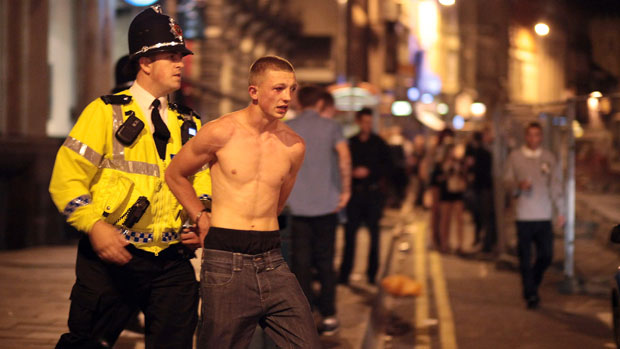Why violent crime has fallen for five years in a row
The NHS treated 32,800 fewer victims of violent attacks last year – but what caused the drop?

A free daily email with the biggest news stories of the day – and the best features from TheWeek.com
You are now subscribed
Your newsletter sign-up was successful
ANNUAL figures from NHS accident and emergency wards show violent crime on the decrease for the fifth successive year. In 2013, just 235,000 people were treated after suffering a violent attack, 32,800 fewer than 2012.
That represents a 12 per cent decline on the previous 12 months, reports the BBC. The last time the figure rose, five years ago in 2008, it went up by seven per cent. Otherwise, the downward trend has lasted since 2001.
The data was collated and examined by researchers at Cardiff University, who say the decline mirrors other crime statistics obtained from police, including reported crime figures and the official crime survey.
The Week
Escape your echo chamber. Get the facts behind the news, plus analysis from multiple perspectives.

Sign up for The Week's Free Newsletters
From our morning news briefing to a weekly Good News Newsletter, get the best of The Week delivered directly to your inbox.
From our morning news briefing to a weekly Good News Newsletter, get the best of The Week delivered directly to your inbox.
The downward trend has of course been welcomed, but what could explain a less violent Britain?
Expensive alcoholThe academics at Cardiff suggest that the rising cost of getting drunk might be playing a part. Lead author Professor Jonathan Shepherd points out that, since 2008, alcohol "has become less affordable". As 18 to 30-year-olds are most prone to be involved in violence, a fall in that section of the population's disposable income is "probably an important factor".
Closing down pubsThe rise in the cost of living since the financial downturn has seen more drinkers staying at home in smaller groups, where they may be less likely to get into a fight. Meanwhile, pubs have been closing down all over the UK. Violence has often flared up in the past when different groups of drinkers meet each other on the street at closing time.
Better policingPolice unions argue that violence, and particularly domestic violence, is now dealt with more effectively by neighbourhood policing teams, and that offenders are rehabilitated more successfully. "Sensible policies balancing enforcement and prevention can have, and are having, an impact," says Max Chambers, head of crime and justice at Policy Exchange. "However, the overall downward trend is repeated in many other countries which suggests something else is happening too."
A free daily email with the biggest news stories of the day – and the best features from TheWeek.com
Cleaner car exhaustsThe fall in violence in the UK parallels falling crime all over western Europe, where it has been in decline for the past two decades after rising for much of the 20th century. There seemed to be no correlation between how severely or leniently a nation treated its criminals and the fall in crime.
One serious scientific theory seeks to explain this: it says that the 20th-century crime wave was caused by exposure to the metal lead – first in house paint, then in car exhaust fumes. Lead is highly toxic and 'biological criminologists' say its effects can cause aggression, violence and poor decision-making, reports the BBC.
The fall in crime in Europe was actually predicted by US proponents of the theory, who had seen it happen over there first (lead was removed from European petrol much later than it was removed from US fuel). Lead takes years to leave the system, the argument says, so the effects were not noticeable until decades after unleaded petrol became the norm.
-
 Political cartoons for February 7
Political cartoons for February 7Cartoons Saturday’s political cartoons include an earthquake warning, Washington Post Mortem, and more
-
 5 cinematic cartoons about Bezos betting big on 'Melania'
5 cinematic cartoons about Bezos betting big on 'Melania'Cartoons Artists take on a girlboss, a fetching newspaper, and more
-
 The fall of the generals: China’s military purge
The fall of the generals: China’s military purgeIn the Spotlight Xi Jinping’s extraordinary removal of senior general proves that no-one is safe from anti-corruption drive that has investigated millions